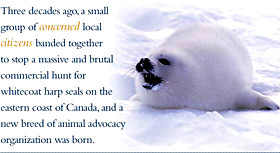 |
 |
 |
 Editorials | Environmental | February 2006 Editorials | Environmental | February 2006  
Mexico Bans Imports and Exports of Primates and Marine Mammals
 IFAW IFAW


| | From the outset, the founders of the International Fund for Animal Welfare, or IFAW, rejected the notion that the interests of humans and animals were separate. Instead they embraced the understanding that the fate and future of harp seals-and all other animals on Earth-are inextricably linked to our own. |
Mexico City — IFAW (International Fund for Animal Welfare - www.ifaw.org) announced that Mexico has banned the importation and exportation of primates and marine mammals. The decree by the Government of Mexico protects animals and confronts the powerful interests that traffic and exploit these species for profit.

"It is an historic victory for endangered primates and marine mammals, for environmental groups and for the general public," said Beatriz Bugeda, Director of IFAW Latin America. "This decision is critical to conservation policy in Mexico, which was seriously eroded by environmental authorities in recent years."

In 2003, the Department of the Environment and Natural Resources (SEMARNAT) illegally authorized the importation of 28 dolphins from the Solomon Islands to Mexican-based commercial dolphinariums. IFAW carried out an in-depth investigation of the facts and filed several complaints to the corresponding authorities. Biologist Diego Cobo Terrazas, then President of the Environmental Commission of the Chamber of Representatives, also criticized the decision and presented a bill to prohibit importation and exportation of primates and marine mammals - such as whales, dolphins, porpoises, sea lions, seals and manatees.

On January 26, 2006, the Decree, which modified the General Wildlife Act, was published in the Official Journal of the Federation and officially prohibited the "…Importing, exporting and re-exporting specimens of any species of marine mammal and primate, as well as parts or products made from them." The law made an exception for animals authorized by the federal government for scientific research. A portion of the law banned products derived from marine mammals, such as pelts and decorations. This becomes a key tool for IFAW in its historic campaign to abolish Canada's commercial seal hunt.

"Mexico has officially condemned Canada's cruel slaughter practiced within the territory of one of its partners in the North American Free Trade Agreement (NAFTA), and in this context, placing a ban on importing marine mammal products is a strategic step," Ms Bugeda said.

In recent years, the Mexican industry of trading and exhibiting marine mammals has grown considerably. Animals used by the industry, like dolphins, are captured without control in the waters of countries such as Cuba, the Solomon Islands and, more recently, Japan.

Dr. Yolanda Alaníz, Director of the organization for the Conservation of Marine Mammals in Mexico (COMARINO), said, "Capturing cetaceans for exhibition presents a serious threat not only to the welfare of the animals themselves, but also to the conservation of the populations from which they are taken."

The ban on capturing marine mammals in Mexican waters was decreed in 2002. That decree also enlarged the polygon of protection for the porpoises known as Vaquita marina. Added to these new reforms, the new laws all contribute to strengthen the legal framework in Mexico to protect animals. IFAW offers special recognition to the efforts made by Biologist Cobo Terrazas and COMARINO.

About IFAW (International Fund for Animal Welfare) : Founded in 1969, IFAW works around the globe to protect animals and their habitats and to create a better world for animals and people. To learn how to help, please visit www.ifaw.org.

Contact Info:
Joaquín de la Torre Ponce
IFAW Latin América
Tel. (+52-55) 5661-4859
Email: jtorreponce@ifaw.org

Chris Cutter (IFAW)
US Tel: 1 (508) 744-2066
Email: ccutter@ifaw.org | 
 | |
 |



